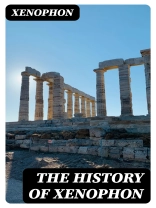In ’The History of Xenophon, ’ the ancient Greek historian and soldier crafts a compelling narrative that intertwines personal experience with broader historical themes, notably the complexities of leadership, warfare, and human nature. Written in a direct and engaging prose style, the text reflects both personal observations from Xenophon’s campaigns and his philosophical reflections on power dynamics. In a literary context that bridges the gap between narrative history and political philosophy, Xenophon employs a distinctive approach that examines the consequences of decisions made in the heat of battle and the virtues of effective governance, influenced by his time among the Greek mercenaries known as the Ten Thousand. Xenophon, a contemporary of Plato and student of Socrates, brings a unique perspective shaped by his experiences as a soldier and a politician in the turbulent landscape of 4th-century BCE Greece. His insights into the moral and ethical dilemmas faced by leaders are informed by his diverse roles, which include historian, philosopher, and military commander. This multifaceted background imbues his writing with a richness and authenticity that resonate throughout his historical inquiries. Readers interested in the intersection of history and philosophy will find ’The History of Xenophon’ an invaluable addition to their library. This work not only provides a vivid account of historical events but also prompts thoughtful reflection on the attributes that define effective leadership. Xenophon’s blend of narrative skill and keen observation makes this text a timeless exploration of human ambition and the lessons learned through conflict.
Om författaren
Xenophon (circa 430–354 BC) was an ancient Greek philosopher, historian, soldier, mercenary, and a disciple of Socrates. As a historian, Xenophon is known for his works on the history of his own times, the sayings of his master Socrates, and the life in ancient Greece. Notably, he authored ’Anabasis, ’ which recounts the adventures of the Ten Thousand, a group of Greek mercenaries hired by Cyrus the Younger in an attempt to seize the Persian throne. This work is also mentioned as ’The History of Xenophon’ and is a classic within military literature, often cited for its vivid description of soldier life and for its lessons on leadership and persistence. Xenophon’s writing style is straightforward and practical, often characterized by his clear diction and vivid detail, and is marked by an emphasis on providing moral lessons and promoting virtuous conduct. Aside from ’Anabasis, ’ his notable works include ’Hellenica, ’ which serves as a continuation of Thucydides’ ’History of the Peloponnesian War’ and provides an account of Greek history from 411 to 362 BC, and ’Cyropaedia, ’ a partly historical, partly fictional biography of Cyrus the Great. Additionally, Xenophon’s ’Memorabilia’ defends Socrates against the charges that led to his trial and execution. Xenophon’s works have been invaluable to historians for their insights into Greek culture, and his philosophic texts contribute to our understanding of Socratic thought.












